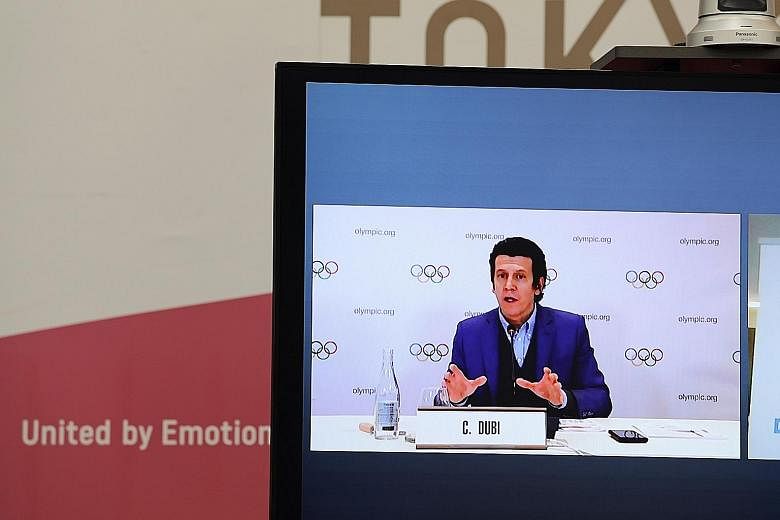TOKYO • The organisers of the delayed Tokyo Olympics yesterday unveiled a set of rules governing how teams move about and interact in order to avoid the spread of the Covid-19 pathogen, assuming that the Games will go ahead this summer as planned.
Coronavirus tests will be conducted before and after arrival in Japan and then at least every four days, with movements in the country limited to a pre-determined plan, according to the first version of a series of "playbooks".
The 32-page document was prepared by the Tokyo organising committee, the International Olympic Committee (IOC) and the International Paralympic Committee. The protocols outlined are aimed at holding a successful Games even as countries across the globe struggle to bring the pandemic under control.
Japan implemented stricter measures last month seeking to reduce infections and pave the way for the Olympics, which were postponed from last year.
While questions linger over whether the Games can be held at all, the playbook is an important step in clarifying the conditions under which they can take place.
The document was light on many details, however, including how and on what schedule participants, athletes and other staff would be tested for the coronavirus.
The organisers said they will decide those specifics in an update in April, in order to make use of the latest technology and when test events are carried out, while a final version will be made public in June.
Games delivery officer Hidemasa Nakamura added that protocols for people working in close proximity to athletes during the Olympics were also being developed.
Participants will need to submit a negative Covid-19 test before departure for Japan.
Singing and chanting during events will be banned, while all participants are subjected to compulsory mask-wearing at "all times" except when eating, sleeping or outdoors. Serious failures to comply with the virus rules may even lead to expulsion from the Games.
But one thing was clear: Vaccinations will not be mandatory.
-
NEW COVID-19 MEASURES FOR GAMES
-
HYGIENE
Wear masks at all times, except when eating, sleeping or outdoors. Ventilate rooms regularly or at least every 30 minutes. Avoid sharing items.
SOCIAL CONTACT
Participants should limit contact with athletes and maintain at least 2m distance. Avoid crowds, enclosed spaces and hugs, high-fives and handshakes. Participants should not use public transport unless given permission.
ENTERING JAPAN
Physical contact should be kept to a minimum during the 14 days before travelling to Japan. Participants are told to prepare a list of all people that they may come into contact with during the Games.
TEST, TRACE AND ISOLATE
Participants will have their temperatures checked every time they enter venues and will need to report their results on a health reporting app. In addition to taking tests within 72 hours before flying to Japan, they will be tested for the coronavirus at the airport and during the Games. Athletes will receive tests at least every four days.
AT THE GAMES
Participants are allowed to support athletes by clapping, but not singing or chanting.
VACCINES
The IOC will work with national Olympic committees to assist athletes and staff to get vaccinated in their home countries. But inoculation is not a requirement to participate in the Games.
SANCTIONS
International delegations will also be required to appoint a Covid-19 liaison officer, who will be responsible for ensuring that the participants follow the guidelines, including regular hand-washing and disinfecting dining tables.
Tokyo 2020 organisers will not require athletes and teams to be inoculated in order to take part, but said instead that they will work with each national Olympic committee to "encourage and assist their athletes, officials and stakeholders to get vaccinated in their home countries, in line with national immunisation guidelines, before they go to Japan".
That also means that the participants will have to comply with the rules in the playbook, whether they have been vaccinated or not.
Teams have also been told not to join events as spectators and not to use public transport. They need to download Cocoa, Japan's smartphone app for contact tracing.
They will not have to quarantine when they arrive in the country, but they will be housed in the Olympic Village rather than being dispersed around hotels in Tokyo.
"Tokyo is the best prepared city we have ever seen," Christophe Dubi, the IOC's Olympic Games executive director, said via video conference.
Pierre Ducrey, the director of Games operations at the IOC, acknowledged Tokyo 2020 will be "different" from past events as the tighter conditions will have "an impact when it comes to the social aspect of what the Olympics experience can be".
However, organisers yesterday insisted that the playbook measures will enable the July 23-Aug 8 Games to be held safely, citing the knowledge on how the coronavirus spreads since the decision last March to postpone the Games by a year, as well as the successful resumption of other pro sports among reasons for the optimism.
The playbook will be updated as necessary, as the pandemic situation changes. The next version of will be released in April.
Decisions on how fans would be handled and the number, if any, will be made within the next few weeks, Dubi added.
BLOOMBERG, REUTERS

